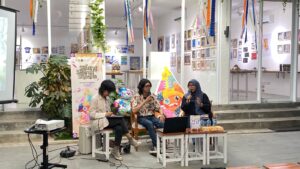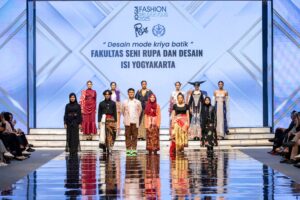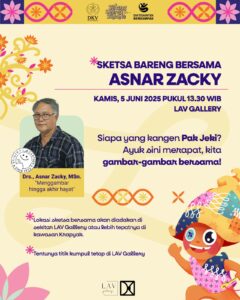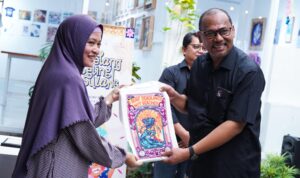ISI Yogyakarta's annual XXXVIII Anniversary celebration program is one of the annual agendas at ISI Yogyakarta. In 2022, ISI Yogyakarta has entered its 38th year. Through the big theme Art Excellence for Life RecoveryThis year, a series of activities will be held involving the entire academic community which includes three faculties (Faculty of Fine Arts, Faculty of Recording Media Arts, Faculty of Performing Arts), Katamsi Art Gallery, and Postgraduate Program ISI Yogyakarta.
The life of a well-run society, with all its colors, suddenly changed drastically when the COVID-19 pandemic hit. Not only in Indonesia, but all over the world. The order that had been running as the flow of life was torn apart, retreated, slowed down, and even partially stopped due to the pandemic. All sectors, from health, economy, education, industry, tourism, to art are affected. Some can still run, some have to stop.
But the pandemic has also taught us a lesson, like life itself, that sometimes a process has to pause. Not only for individuals, but also for society in general. For two years, change after change and adjustment after adjustment took place. Some of them were forced by circumstances, while others gave birth to human creativity in solving the problems they faced.
So it is with art.
The pandemic has changed many aspects of art and artistic life. In many ways, art has not experienced significant disruption. But in relation to art actors and audiences, change is a consequence.
How art is produced and how it is presented to the public is also affected by the pandemic. Restrictions on inter-personal contact, which for artists can be interpreted as seclusion in the creative process, is one example. Likewise, the prohibition on gathering, which impacts on how people enjoy art, has led to breakthroughs and adjustments that were previously unthinkable.
In the field of fine arts, the rise of electronic visual arts, complete with online exhibitions, is one example. Even in recent developments, Non-Fungible Tokens (NFTs) have entered the art community, artists, and art activities.
Back to "Normal" Phase
The pandemic is now undergoing its final stage, which in official terms will soon enter the endemic era. How will art respond to this process of change? Will art return to its old habitat before the pandemic? Or will the changes that have occurred survive and become a new medium? Is it possible that the old habitat will collaborate with the new habitat and give birth to a completely new post-pandemic art ecosystem?
Art will return to a "normal" situation. However, the "normal" in quotation marks holds a question mark as to whether the normal is the original condition, or a new normal that has a different order.
On the other hand, there is also the question of how art will play a role in this change. The end of the pandemic is not just a health issue. It is a life issue, where art is one of the important elements. The process of society recovering from the downturn of the past two years cannot be separated from the role of art. More than that, art must even independently express support, help the community, help empower and accelerate the recovery of life.
For this reason, ISI Yogyakarta chose the theme Art for the Restoration of Life as the theme of this year's 38th anniversary.
Art for Life Recovery does not only mean that the role of artists will be very important in the recovery process. Art as a field of life, will show more support for the community.
On a broader scale, the role of art in this recovery is in line with Indonesia's spirit within the framework of the G20 meeting: Recover Together, Recover Stronger. Art not only provides a vehicle for us to recover together, but also to become a stronger society.
In this regard, the 38th anniversary committee of ISI Yogyakarta will organize a number of activities, which are incorporated in two major agendas, namely the Fine Arts Exhibition and the Design Thinking Workshop, as the agenda in a series of Art for Life Recovery activities.
- Fine Art Exhibition
Included in the agenda of this activity are art exhibitions, fashion shows, digital poster competitions, and ISI Yogyakarta batik motif design competitions at the National level.
All activities in this art exhibition agenda are organized by inviting partner universities of ISI Yogyakarta, both from within and outside the country. From within the country, these universities have joined the Indonesian Art College Cooperation Agency (BKSPTSI). In addition, universities that are members of department/prodi associations, and universities that have collaborated, both in the form of MOUs and PKSs, were also invited.
The art exhibition will showcase the best works of art as part of the history of art development in Indonesia. All students of the Faculty of Fine Arts ISI Yogyakarta, and all partner universities, domestic and foreign, are eligible to participate in this activity.
Students from overseas partner universities were invited from Thailand, Malaysia, Philippines, China, South Korea, Hungary, Madagascar, Australia, Japan, Austria, Vietnam.
- Design Thinking Workshop
Design Thinking is a method, mindset, or process for empathizing with human-focused problems. Design Thinking is also a recipe for product and service innovation in business and social contexts. Design Thinking is generally used to solve problems effectively, understand the user of a design product and their needs so as to redefine the problem.
As a method, Design Thinking has a number of advantages, such as :
a. To bridge business objectives and increase employee capacity.
b. Focus on solving the problem.
c. Create loyalty to customers.
d. Create innovative ideas and solutions.
e. It is more efficient and can be applied anywhere.
The design thinking workshop is a routine activity that has been going on for eight years. This activity is carried out based on the MOU between ISI Yogyakarta and Hochschule Hannover, Germany.
This program has provided many benefits, not only to the institution but also to the community at large, especially MSME players in Yogyakarta and Central Java.
This activity every year always involves small business partners and creative industry players, to see firsthand the problems that they are not aware of. Through the design thinking method, students of ISI Yogyakada and Hochschule Hannover, put forward empathy for complex problems, which are not realized and may not be solved by the creative industry players.
Therefore, this program is one of the flagship programs that continues to be fostered and maintained because of its broad, and very real impact on society and academics at ISI Yogyakarta.
This eight-day workshop activity is held annually by involving multi-disciplinary and multi-cultural students as participants. Previously held face-to-face, during the pandemic the workshop had to be held online and the duration was shortened to three days.
However, this will not limit the creativity and fresh ideas of students in solving problems faced by artists and creative industry players.
The following is the agenda of the XXXVIII Anniversary of ISI Yogyakarta





